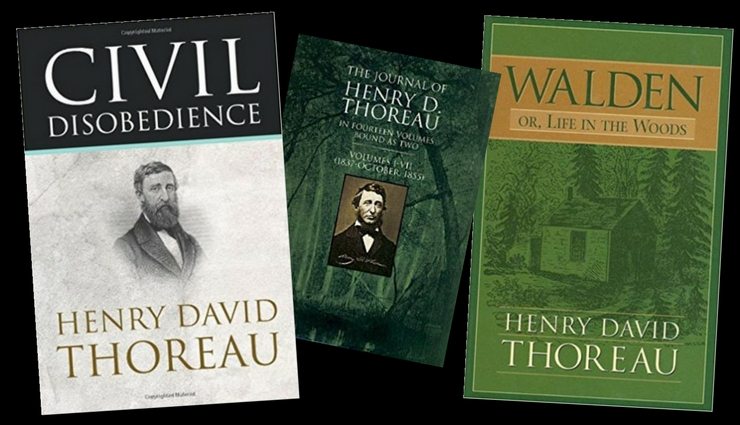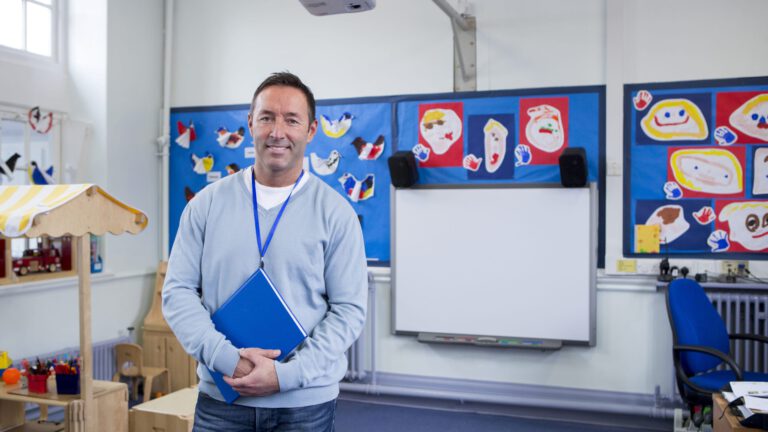Thoreau on Education

This July marks the 200th anniversary of Henry David Thoreau’s birthday. More than a few Thoreau scholars have used this bicentennial as an opportunity to weigh in not only on Thoreau’s life and work but also to reflect on what Thoreau might of thought about aspects of modern American life.
Thoreau had a great deal to say about education, of course. He was the epitome of a lifelong learner, taking copious notes on nature (notes that are being examined today to understand the effects of global warming) and writing observational, argumentative, and analytical essays throughout his life. His journals are immense and still being studied for information and insight.
While a student at Harvard, Thoreau taught for a time. Afterward, he tried teaching full-time at the Center School in Concord, but resigned quickly when told he needed to use more corporal punishment to keep students in line. Shortly after, he took over Concord Academy (not the same school as the current Concord Academy) and taught with his brother John. After John took ill with tuberculosis, they closed the school. Thoreau only formally taught for two years, but he thought often about how we learn and had plenty of criticism of Harvard and formal education in general.
Given Thoreau’s views as a Transcendentalist and constant cultural critic, it’s not surprising that he stood outside the educational mainstream of his time. What’s interesting is that his views presaged what many schools do today based on recent brain-science research. In particular, he understood the importance of hands-on learning, student-directed learning, and the notion that teachers should be coaches rather than expert lecturers. But he also believed in rigorous studies.
Writer Jonathan Kozol warns us not to reduce and repackage Thoreau to fit our own purposes. “The ideal notion that a child learns ‘by doing’ is confused too frequently with the calamitous idea that children never learn by reading or by listening or writing and rewriting in the same painstaking way that Thoreau did.”
“Thoreau choose to see education not simply as a means, a preparation for something else, but as intrinsically valuable…,” writes Martin Bickman, professor of education at the University of Colorado at Boulder, in “Uncommon Learning: Henry David Thoreau on Education.” “Thoreau envisioned…a working dialectic of thinking and doing, of transmitting old cultural forms and creating new ones, of a democratic schooling and the pursuit of excellence.”
There are plenty of contradictions in Thoreau’s views of education — and just about everything else. But he was well aware of this and didn’t mind the idea that something can have two sides or even simultaneously contain opposites. In this regard, it’s kind of fun to follow Thoreau’s iconoclastic mind as it explores education. Mostly though, Thoreau asks us over and over to use our minds well.
Here are some of our favorite quotes:
“What does education often do!— it makes a straight cut ditch out of a meandering brook.”
— Journal, October 31, 1850
“I would make education a pleasant thing both to the teacher and scholar…We should seek to be fellow students with the pupil, and should learn of, as well as with him, if we would be most helpful to him.”
— Letter to Orestes Brownson
“The forcible writer stands bodily behind his words with his experience — He does not make books out of books, but he has been there in person.”
— Journal, February 3, 1852.
“It is only when we forget all our learning that we begin to know. I do not get nearer by a hair’s breadth to any natural object so long as I presume that I have an introduction to it from some learned man.”
— Journal, October 4, 1859
“When any real progress is made, we unlearn and learn anew, what we thought we knew before.”
— Journal, December 31, 1838
“My desire for knowledge is intermittent but my desire to commune with the spirit of the universe — to be intoxicated with the fumes, call it, of that divine nectar — to bear my head through atmospheres and over heights unknown to my feet — is perennial and constant.
— Journal, February 9, 1851
“To be a philosopher is not merely to have subtle thoughts, nor even to found a school, but so to love wisdom as to live according to its dictates a life of simplicity, independence, magnanimity, and trust. It is to solve some of the problems of life, not only theoretically, but practically.”
— “Walden”
“I maintain that the Government ought to provide for the education of all children who would otherwise be brought up, or rather grow up, in ignorance.”
— Early Essays
“To my astonishment I was informed on leaving college that I had studied navigation! — why, if I had taken one turn down the harbor I would have known more about it.”
— “Walden”
“I think it would be worth the while to introduce a school of children to such a grove, that they may get an idea of the primitive oaks before they are all gone, instead of hiring botanists to lecture to them when it’s too late.”
— Journal, November 2, 1860
“Read the best books first or you may not have a chance to read them at all.”
— “A Week on the Concord and Merrimack Rivers”
“Books must be read as deliberately and reservedly as they were written.”
— “Walden”
“How vain it is to teach youth, or anybody, truths! They can only learn them after their own fashion, and when they get ready.”
— Journal December 31, 1859
“Children who play life, discern its true law and relations more clearly than men, who fail to live it worthily, but who think that they are wiser by experience, that is, by failure.”
— “Walden”
“Mathematics should be mixed not only with physics but the ethics, that is mixed mathematics.”
— “A Week on the Concord and Merrimack Rivers”
“What their hands find to putter about, or their minds to think about, — let them write about.”
— letter to Helen Thoreau
“The grammarian is often one who can neither cry nor laugh, yet thinks that he can express human emotion.”
— Journal, January 2, 1859
“How many a man has dated a new era in his life from reading a book.”
— “Walden”








